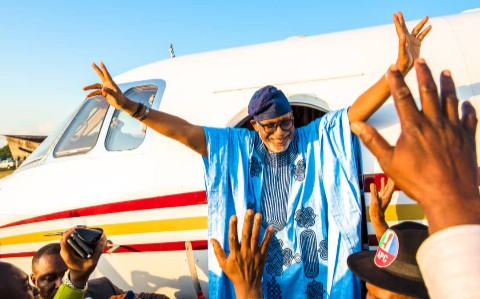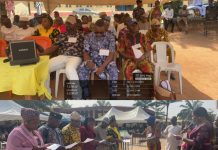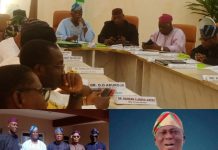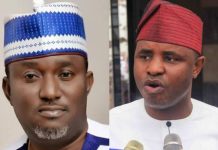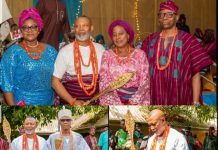
The Arakunrin Oluwarotimi Odunayo Akeredolu-led administration which came into being on Friday, February 24, 2017 came up with a comprehensive change policy and programme blueprint tagged ‘Blueprint to Progress’ which is anchored on five cardinal programmes, popularly known as Platforms for Change and is encapsulated in the acronym JMPPR. The R in the series represents ‘Rural Development and Community Extension Services’. Rural development and a strong agricultural sector reduce poverty and form the basis for sustainable economic development at all levels. The only way to stem the rural exodus, which is driving more and more rural inhabitants into the cities in search of a greener pasture is to strengthen the economic base of the rural communities and offer people in the rural areas a secure future.
Until the coming on board of the Arakunrin Oluwarotimi Odunayo Akeredolu-led administration in Ondo State the living conditions of the people in the rural areas of the state are very poor. Poverty and hunger are widespread, basic services are not guaranteed while schools and hospitals are frequently inaccessible.
Since his inauguration as the Executive Governor of Ondo State, Arakunrin Oluwarotimi Odunayo Akeredolu has continued to show uncommon commitment to his pact with the people to ensure the transformation of the rural areas of the state through the Directorate of Rural and Community Development and the two World Bank-assisted Agencies under the Directorate; the Ondo State Community and Social Development Agency (ODCSDA) and the Rural Access and Agricultural Marketing Project (RAAMP).
In June 2019, Governor Oluwarotimi Akeredolu rejigged his cabinet by effecting some major reshufflements. These major shake-ups in the administration brought onboard Hon. Babatunde Gabriel Kolawole who just completed his term as a Member of the Federal House of Representatives representing Akoko South East/Akoko South West Federal Constituency. On being sworn in July 4, 2019, Hon. Babatunde Gabriel Kolawole who is popularly known as the Amaechi of Ondo State was assigned the portfolio of the Special Adviser to the Governor on Rural and Community Development. Thus, he is to oversee the implementation of one of the five (5) point agenda of the present administration in the state which is Rural Development and Community Extension Services through the Directorate of Rural and Community Development.
The mandate of the Directorate of Rural and Community Development is to redress generation of the neglect of rural communities in the state in the following ways:
i.mobilize and empower the rural populace to create wealth through increased agriculture, industrial and other productive activities;
ii.promote the expansion of the production base of the rural economy through the creation and expansion of agricultural enterprises;
iii.provide rural support services needed to bring about increased production of goods and services and raise rural production in general; and
iv.improve the productivity of human resources in the rural communities; develop the rural area and raise the quality of life of the rural dwellers.
In line with the above-outlined mandate, the Directorate under the watch of Hon. Babatunde Gabriel Kolawole, the Special Adviser to the Governor on Rural and Community Development has carried out needs assessment exercise tagged ‘bottom-up approach’ across the three senatorial districts to ensure that the felt-needs of the people are met. The exercise provided our rural dwellers the rare opportunity of deciding projects to be executed in the their various localities. Earlier, a pre-needs assessment appraisal stakeholders’ meeting was held inside the newly renovated and well-furnished Conference Hall of the Directorate at the State Secretariat Annex along Ilesha/Owo Expressway in Akure to sensitize participants and seek their cooperation on the scheduled needs assessment exercise. It is pertinent to point out here that the Conference Hall was in a very deplorable state until the recent renovation work carried out under the leadership of Hon. Babatunde Gabriel Kolawole. Participants at the said stakeholders’ meeting include Local Council Caretaker Chairmen, royal fathers, experts, religious leaders, civil society organizations, market women, youth organizations and Directors of Community Development Department in the eighteen local government areas . Inputs from the field officers and experts engaged for the weeklong exercise have been Incorporated into the 2020 budget of the Directorate. In effect, projects to be executed by the Directorate in the coming year(s) will be those that have direct impact on the people and it will, as well, eliminate duplication of projects. This is a clear departure from the past when government adopted the top-bottom approach in projects execution.
Also, top officials of the Directorate of Rural and Community Development recently embarked on a statewide tour to have first-hand information about abandoned projects initiated by the defunct Ministry of Community and Co-operative Services under previous administrations with a view to completing them for use of the benefitting communities.
The inauguration of the Community Development Committees (CDCs) at the ward level across the eighteen local government areas of Ondo State by the Special Adviser to the Governor on Rural and Community Development Hon. Babatunde Gabriel Kolawole is to further enhance the participation of the people at the grassroot in projects documentation and implementation. Under this programme, ten (10) people which include community leaders, religious leaders, market women, youths, Community Development Association officials, farmers and retired civil servants were selected across the 203 wards. They are being empowered to initiate and monitor projects in their various wards.
The Directorate of Rural and Community Development which is being supervised by the Special Adviser to the Governor on Rural and Community Development, Hon. Babatunde Gabriel Kolawole, has two World Bank-assisted Agencies (ODCSDA and RAAMP) under its watch.
The Ondo State Community and Social Development Agency (ODCSDA) uses the bottom-to-top approach, where communities apply for intervention in the provision of social amenities in form of Micro-Projects. Community and Social Development Project (CSDP) is a Community Driven Development (CDD) Project focusing on building and rebuilding social and natural resource infrastructure services at the community level.
The overall goal of the CSDP is improved access to services for human development, while the Project Development Objective is to sustainably increase access of poor people to social and natural resource infrastructure services. The CSDP seeks to promote the human development of poor people at the grass root level using a CDD approach. It is for this reason that the CSDP is set to contribute to an overall goal of improved access to services for human development.
CSDP assist communities in the implementation of their felt needs with micro projects in Education, Health, Rural Electrification, Transportation, Water, Socio-Economic, Environment/Natural Resource and Gender & Vulnerable Groups (GVG). CSDP implementation strategy is the bottom-up community driven development approach which is in tandem with the participatory governance norms. This implementation strategy allows communities to plan, part-finance, implement, monitor and maintain sustainable and socially inclusive multi-sectoral micro-projects with special consideration for the gender and vulnerable members of the society.
As a Community Driven Development, communities contribute 10 per cent project cost for a Community Development Plan (CDP) or 5 per cent for Group Development Plan (GDP). This contribution is either in kind or cash while the Ondo State Community and Social Development Agency (ODCSDA) assist with the remaining 90 or 95 per cent. Since 2017 when the present administration came on board the Agency has intervened in 68 Communities and 17 Vulnerable Groups have also been empowered to execute their prioritized socially inclusive projects to complement efforts at implementing the JMPPR priority policies and programs of this government. A total sum of about #800 million has been expended on 170 Micro-Projects spread across the state by the Agency since 2017.
The other World Bank-assisted project is the Ondo State Rural Access and Agricultural Marketing Project (RAAMP). The RAAMP is a window of opportunity opened by the World Bank, the French Development Agency and the Federal Government to ensure prosperous lives for farmers and people in the hinterland through access and value addition to farm produce.
RAAMP is set to improve rural access and agricultural marketing while enhancing sustainability of the rural and state road network. The Project Development Objective (PDO) is to improve transport conditions in Ondo state and bring sustained access to the rural populace, through constructing, rehabilitating and maintaining key rural transport infrastructure in a sustainable manner in selected communities in the state. When there is rural access, there will be reduction in post harvest losses and farmers will get the right value for their produce. In other words, an improved rural access will enhance the agricultural potentials and marketing opportunities for the agrarian rural communities in state and, by extension, help in the improvement of livelihoods of the rural population.
The Project has identified and prioritized rural roads connecting communities of small holder farmers to the closest markets (agro-logistics hubs).
In the last three years of the Arakunrin Oluwarotimi Odunayo Akeredolu-led administration, the Ondo State RAAMP has been able to achieve the following:
i.Constitution of the State Project Implementation Unit (SPIU) through competitive selection.
ii.Completion of Rural Access Road Prioritization Study.
iii.Completion of Agro-Logistic Prioritization Study.
iv.Completion and disclosure of Resettlement Policy Framework.
v.Completion and disclosure of Environmental and Social Management Framework.
vi.SPIU participation on World Bank Technical Mission at different time.
vii.Payment of N500 Million into the Project Account as Counterpart and Project Preparation Funds by the State Government.
viii.Completion of the Construction of 5.35km Molenge-Igboroko-Ute/Owo Road.
ix.Soil Stabilization of 2km along Molenge- Igboroko-Ute/Owo Road.
x.Completed the evaluation of submitted Expression of Interest for Preliminary Design of 500KM rural roads.
xi.Advertisement and evaluation of Environmental and Social Impact Assessment (ESIA) and Resettlement Action Plan (RAP) is ongoing.
xii.Design of 62.5KM of selected rural roads across the three (3) senatorial district in the state.
All is now set for the commencement of major construction work in all the selected rural roads across the state within the first quarter of year 2020.
It is gratifying to add here that the Arakunrin Oluwarotimi Odunayo Akeredolu-led administration has shown commendable impacts in its efforts at raising the standard of living in the rural communities across Ondo State. We are not just witnessing transformation in our rural communities, there is an all round development in all other sectors of the state. No doubt, the present administration has demonstrated uncommon commitment to all articles of its JMPPR blueprint as a proven effective roadmap for the execution of the developmental plans and projects for the state. This blueprint is anchored on five (5) cardinal programmes. They are: (1) Job Creation through Agriculture, Entrepreneurship and Industrialisation; (2) Massive Infrastructural Development and Maintenance; (3) Provision of Functional Education and Technological Growth; (4) Provision of Accessible and Qualitative Health Care and Social Service Delivery; (5) Rural Development and Community Extension Services.
Kolawole Babatunde (Amaechi), a Special Adviser to Governor Akeredolu on Rural and Community Development writes from Akure, the state capital.


